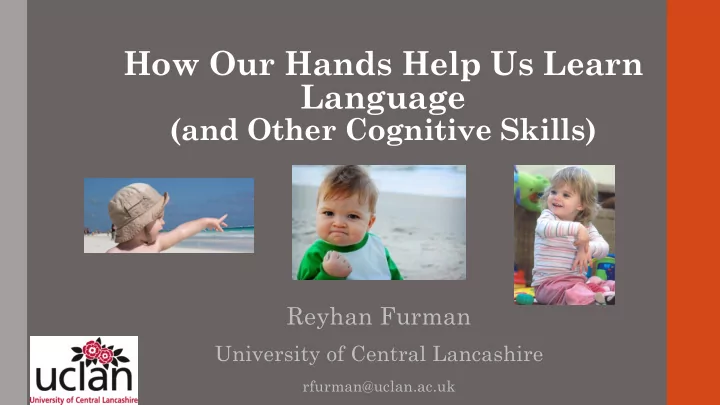

How Our Hands Help Us Learn Language (and Other Cognitive Skills) Reyhan Furman University of Central Lancashire rfurman@uclan.ac.uk
Gestures • Gestures spontaneously and frequently accompany speech. Pointing, iconic, conventional gestures Tight integration pragmatically, semantically, and temporally. • Gestures are found across cultures, ages and tasks. • Gestures are part of language.
Gesture and speech: Language • Gesture is a resilient feature of human development. Develops with minimal or no visual input (Iverson &Goldin- Meadow 1998) • A strong processing link exists between speaking and gesturing. We spontaneously produce gestures even when the listener cannot see them (Iverson & Goldin-Meadow, 1998) . • Gesturing (or lack of gesturing) can influence speaking. When we are prohibited from gesturing, speech becomes less fluent.
Gesture and speech: Language • Gestures only occur during speech: Gestures by listenes are extremely rare. 90% of gestures are done with speech. • Gestures and speech represent the same information most of the time (Bernardis & Gentulucci, 2006) .
Gestures reflect language development • Gesture use at 14 months predicts vocabulary size at 54 months (Rowe & Goldin-Meadow, 2009) the more different objects gestured, the larger the vocabulary size.
Gestures reflect language development • Early gesture-word combinations predict the onset of two word utterances (Iverson & Goldin Meadow, 2005). • It’s the relation between speech and gesture that predicts the onset of two word speech, not merely the presence of gesture itself: N “mommy” + point at mom Y “mommy” + point at shoe
Gestures develop with language • Early on, English- speaking children use pointing gestures and very few iconics (Acredelo & Goodwyn, 1985; Bates, 1976). • At 26 months, they start to use iconic gestures- a slow increase till age 3 (5% of all gestures) (Özçalı ş kan & Goldin- Age: 42 months Meadow, 2011).
Gestures develop with language • Early use of verbs coupled with early production of iconic gestures at ~20 months in Turkish (Furman, Küntay & Özyürek, 2014) . Speech: Anne attı . “ Mommy threw. ” Gesture: Iconic Age: 22 months
Gesture reflects readiness to learn • 4 + 2 + 6 = ___ + 6 • 4 + 2 + 6 = 12 + 6 • Children who produce many gesture-speech mismatches on the math task are more likely to learn how to solve the problem after a math lesson (Alibali & Goldin-Meadow, 1993) Compared to children who do not produce gesture-speech mismatches on the problem.
Gesture reflects readiness to learn • Gesture-speech mismatches also predict increased learning in children solving: Conservation problems (Church & Goldin-Meadow, 1986) Balance problems (Pine, Lufkin & Messer, 2004) • Gesture-speech mismatches juxtapose two different ideas across two modalities within a single response.
Educational implications • Gesture is a robust part of language. • Including the manual modality helps us gain deeper knowledge into children’s language learning and learning in general. • Across a wide range of cognitive domains, gesture reveals information about children’s reasoning and problem solving not found in their speech.
Any questions or comments?
Recommend
More recommend